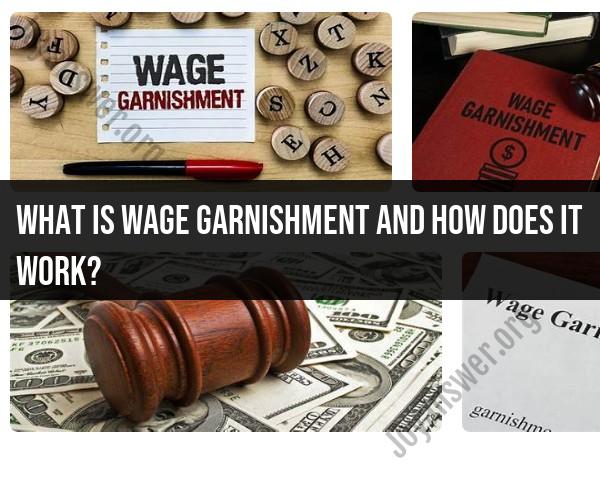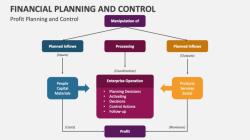What is wage garnishment and how does it work?
Wage garnishment is a legal process in which a portion of an individual's earnings is withheld by their employer to satisfy a debt. This process is typically initiated by a court order or government agency, and it is often used as a means to collect unpaid debts, such as child support, taxes, student loans, or court-ordered judgments.
Here's how wage garnishment generally works:
Court Order or Judgment:
- The process usually begins with a creditor taking legal action against a debtor. This can involve filing a lawsuit and obtaining a court judgment.
Notification to Employer:
- Once a judgment is obtained, the creditor can seek a court order for wage garnishment. This order is then provided to the debtor's employer, directing them to withhold a specific amount from the debtor's wages.
Percentage Limitations:
- Federal and state laws often impose limits on the amount that can be garnished from a person's wages. These limitations are in place to ensure that the debtor has enough income to cover basic living expenses.
Withholding by Employer:
- The employer is legally obligated to comply with the court order and withhold the specified amount from the employee's paycheck. The withheld funds are then sent directly to the creditor.
Continuation Until Debt is Satisfied:
- Wage garnishment continues until the debt is fully paid off, the court order is modified or terminated, or the debtor successfully challenges the garnishment.
It's important to note that certain types of income, such as Social Security benefits, are generally protected from wage garnishment. Additionally, different jurisdictions may have variations in the laws governing wage garnishment, including the maximum percentage of income that can be garnished.
It's advisable for individuals facing wage garnishment to seek legal advice to understand their rights and explore potential options, such as negotiating a repayment plan or filing for bankruptcy, which may impact or halt the garnishment process. If someone is experiencing financial difficulties, reaching out to the creditor to discuss payment arrangements before legal action is taken may also be an option.
What is wage garnishment and how does it work?
Wage garnishment is a legal procedure that allows a creditor to collect a debt from a debtor by withholding a portion of their earnings from their employer. It is typically used as a last resort when a debtor has defaulted on a loan or other debt obligation.
How wage garnishment works:
Court Order: A creditor must obtain a court order to garnish a debtor's wages. This order will specify the amount of money that can be withheld from the debtor's paycheck and how often the withholding should occur.
Notice to Employer: The creditor will then notify the debtor's employer of the garnishment order. The employer is legally obligated to comply with the order and must begin withholding the specified amount from the debtor's paychecks.
Withholding and Payment: The employer will withhold the specified amount from the debtor's paychecks and send it directly to the creditor until the debt is paid off or the garnishment order expires.
What are the legal implications of wage garnishment?
Wage garnishment can have significant legal implications for both the debtor and the creditor.
Debtor's Implications:
Reduced Income: Wage garnishment can significantly reduce a debtor's disposable income, making it difficult to meet basic living expenses.
Credit Score Impact: Wage garnishment can negatively impact a debtor's credit score, making it harder to obtain loans or rent an apartment in the future.
Employment Consequences: In some cases, wage garnishment can lead to job loss, as employers may view it as a sign of financial instability.
Creditor's Implications:
Debt Collection Effectiveness: Wage garnishment can be an effective method for creditors to collect debts, as it directly targets the debtor's source of income.
Legal Compliance: Creditors must adhere to strict legal procedures when garnishing wages, including obtaining a court order and notifying the debtor's employer.
Reputation Management: Creditors must balance their debt collection efforts with maintaining a positive public image to avoid accusations of unfair or predatory practices.
How can individuals handle wage garnishment situations?
If you are facing wage garnishment, there are steps you can take to manage the situation and protect your financial well-being:
Understand the Garnishment Order: Carefully review the court order to understand the amount being withheld, the frequency of withholding, and the creditor's contact information.
Contact the Creditor: Reach out to the creditor to discuss the debt and explore possible repayment options, such as negotiating a settlement or making smaller, more manageable installments.
File for Exemption: Depending on your state's laws, you may be able to file for an exemption to protect a portion of your wages from garnishment. This exemption may be based on income level, dependents, or other factors.
Seek Legal Assistance: Consider consulting with an attorney specializing in consumer law or debt collection. They can advise you on your rights and options, and they may be able to negotiate with the creditor on your behalf.
Create a Budget: Develop a realistic budget to manage your finances effectively with reduced income. Prioritize essential expenses such as housing, utilities, and food, and consider seeking assistance from financial aid programs if necessary.












